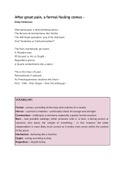After great pain, a formal feeling comes -
Emily Dickinson
After great pain, a formal feeling comes –
The Nerves sit ceremonious, like Tombs –
The stiff Heart questions ‘was it He, that bore,’
And ‘Yesterday, or Centuries before’?
The Feet, mechanical, go round –
A Wooden way
Of Ground, or Air, or Ought –
Regardless grown,
A Quartz contentment, like a stone –
This is the Hour of Lead –
Remembered, if outlived,
As Freezing persons, recollect the Snow –
First – Chill – then Stupor – then the letting go –
VOCABULARY
Formal - serious, according to the rules and customs of a society
Nerves - a person’s emotions - particularly those of courage and strength
Ceremonious - relating to a ceremony, especially a grand, formal occasion
Bore - two possible readings, either someone who is ‘a bore’, a boring person or
someone who bears the weight of something - in this instance, the latter
interpretation is more likely to be correct as it makes more sense within the context
of the poem
Mechanical - behaving like a machine
Ought - acting according to duty
Regardless - despite being
, Quartz - a hard, translucent rock that is often white, clear or rose in colour
Contentment - satisfaction
Outlived - managed to last longer, to live longer than something
Stupor - dulled senses, lack of feeling or sensitivity to anything
STORY/SUMMARY
Stanza 1: After a person has suffered great pain, they are taken over by a formal,
serious feeling - their nerves sit in a ceremonious way in their mind, as if partaking in a
formal occasion, as though they are tombs - the stiff heart asks: “Was it he, that put up
with the suffering?” and “when did the pain start - was it yesterday, or centuries ago?”
Stanza 2: The feet act mechanically, walking round in a wooden, stiff way - they grow
indifferent to whether they are walking on the ground, or air, or anything - they take on
quartz contentment, as if they were made of stone
Stanza 3: This, what you’re experiencing now, is the hour of lead - if you manage to
outlive it, you will remember it in the same way that freezing people remember the
snow (as a trauma, a moment of intense shock and suffering) - it first comes over you
as a chill, then numbness, then finally you manage to let go of the pain -
SPEAKER/VOICE
The speaker uses the third person to try and objectively describe the feeling of loss,
grief or trauma as impersonally as possible. This is perhaps to convey the sense of
numbness that comes along with experiencing great difficulty; it may also be an
expression of the way in which people try to mask their intense feelings, or confront
them using logic and formal solemnity.





